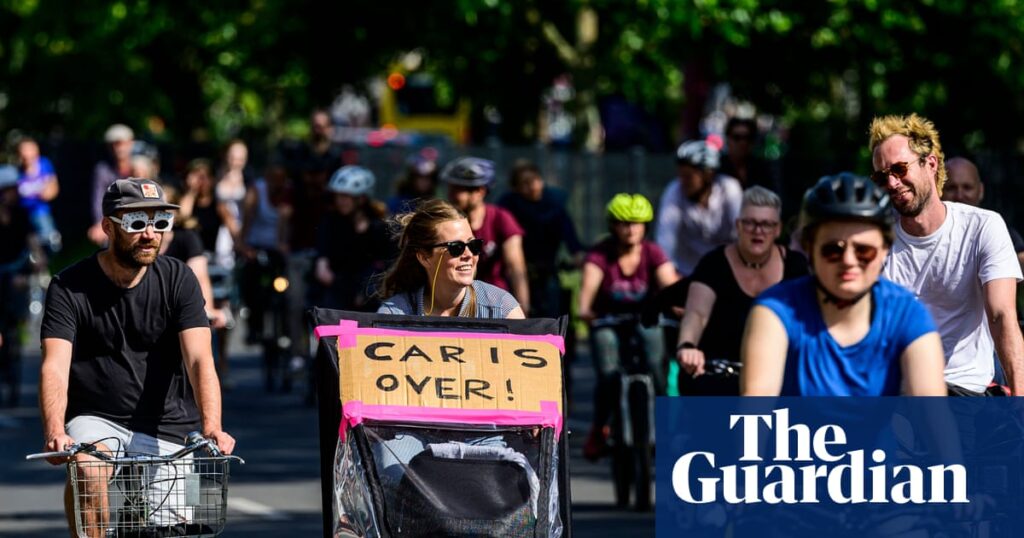
In the aftermath of World War II, Berlin embraced a transformative vision of mobility, reconstructing itself as a city dominated by German-engineered automobiles. Tramlines were dismantled, particularly in the capitalist west, to accommodate the burgeoning number of motorists, while bicycles were pushed to the periphery. Thus, the concept of the autogerechte Stadt (car-friendly city) was born.
Fast forward 80 years, and the dream of individual car transport has resurged in the German capital. As cities like Paris, Amsterdam, and Copenhagen adopt more climate-, bicycle-, and pedestrian-friendly policies, critics argue that Berlin is reversing course.
Julia Schmitz, a community affairs reporter, recently wrote in Der Tagesspiegel, “It’s not an unreasonable demand that Berlin … actively ensures that everyone who is not surrounded by a tonne of metal feels safe in public spaces.”
Current Transport Policies Under Scrutiny
While Berlin boasts a low car-to-person ratio and an extensive public transport system, the latter suffers from underfunding. The city’s bicycle lanes, once considered cutting-edge, now appear chaotic and outdated. The struggle to balance these interests has divided the city since the pandemic, creating a rift within the ruling coalition of the conservative Christian Democratic Union (CDU) and the centre-left Social Democratic Party (SPD).
The CDU’s victory in the 2023 election was partly fueled by a backlash against the previous government’s car-critical policies. The debate has taken on a cultural dimension, with the far-right Alternative für Deutschland advocating for motorists’ rights.
Policy Changes and Public Reaction
The new government began by canceling a pilot project to pedestrianize a section of Friedrichstrasse, a prominent shopping street. More recently, it announced budget cuts for bike lanes and pedestrian safety in 2026 and 2027, reducing funds from €5.4 million to €2.6 million. Subsidies for bike sharing are also under threat.
Meanwhile, residential parking permits have remained capped at just over €10 per year since 2008, a fraction of their administrative cost. In September, speed limits on over 20 busy streets increased from 30 km/h to 50 km/h after meeting emission-reduction targets, prompting public outcry. Ute Bonde, the city’s top transport official, stated, “If I don’t have a reason to set out 30 km/h then I’m not allowed to because that’s what German [federal] law stipulates.”
Environmental Initiatives and Challenges
In a bid to absorb emissions, Berlin announced a plan to plant one million trees by 2040 at a cost of €3.2 billion. However, experts highlight the irony that stringent road laws could impede this initiative, requiring zoning permission for each new sapling.
Giulio Mattioli, a transport researcher at the University of Dortmund, commented, “I think if we’re talking about this new wave of sustainable transport measures that we see in many cities across Europe, then definitely Berlin is not following those and even working in the other direction.”
Mattioli added that Berlin seems to be catching up with urban development trends from the 1980s and 1990s, such as completing the A100 autobahn encircling the city. “Among the elites there’s still something of that mindset, while in those other cities things have moved on,” he remarked.
Community Concerns and Future Directions
Johannes Kraft, a CDU transport expert, argues that the focus has shifted too far from motorists. “The goal is to renovate and expand infrastructure for all modes of transport,” he stated at a public hearing, emphasizing that “the car belongs in Berlin.”
The redevelopment of Torstrasse, a major thoroughfare, has become a flashpoint. The redesign involves cutting down mature trees, reallocating pavement space for a bike lane, and restricting parking to maintain traffic flow. These plans have sparked protests and heated debates at community meetings.
Giuseppe Amato, an Italian restaurant owner on Torstrasse, expressed concern: “How am I supposed to do business? They’re going to make it boring, that’s my biggest fear.”
Carina Haering, a teacher, wishes for political will to reduce vehicle transport in bustling areas. As Berlin navigates these complex issues, the city’s future as a car-centric or green-friendly metropolis hangs in the balance.





